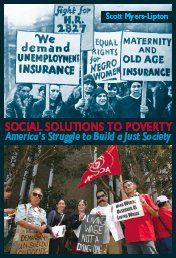GULFPORT, MS /PRNewswire/ --The bus carrying the students from Louisiana Winter—a college initiative that believes that the social suffering in the Gulf Coast is this generation’s human rights struggle—left Xavier University in New Orleans at the crack of dawn, and arrived a few hours later in Mississippi.
The students’ goal today was to discuss the Gulf Coast Civic Works Project with the communities of Gulfport, Pass Christian, and Long Beach. The Louisiana Winter students believe that the government should develop federal legislation that would hire 100,000 local residents to rebuild their communities. If the civic workers do not have the skills, they would be trained to be plumbers, electricians, bricklayers, and air conditioner technicians.
At Mississippi Gulf Coast Community College, students heard about how Mississippians have a strong independent streak, but at the same time, many feel let down by the government’s inadequate response to Hurricane Katrina. Kay Bethea, who lives on the beach in Gulfport described how a 26-foot surge of water from the Gulf Coast hit her house. She stated that “Gulf Coast people are very tough-minded, and independent. I have taken care of myself—for what feels like 100 years. I do not expect much from my government, and I have even got less. My neighborhood would still be stinking and rotten if I depended on the government. From the top on down to the city level, I would pretty much say…” and then she blew a raspberry.
Many of the people in the community are rallying to support the idea of 100,000 jobs for Gulf Coast residents. An instructor at the community college, LeeAnn Rasmussen described that, “In light of our independence, self help, and strong will, I decided to support the Gulf Coast Civic Works Project because it makes sense and it is practical. If we can rebuild our own communities, we can rebuild not only the houses that we lost, but our spirit as well. We can get our voice back.”
Students spent the late morning and afternoon handing out fliers and dialoguing with the residents about the idea of a public works project. The leafleting will continue on Thursday, January 18, culminating in a town hall meeting at the Mississippi Gulf Coast Community College-Jefferson Davis Campus Auditorium that night at 7 pm.
One of the participants in Louisiana Winter is Rachel Recore, a first-year student at Mississippi Gulf Coast Community College. Standing in the midst of destroyed houses, she noted, “It is obvious that we need to rebuild our community. Just look at the destruction all around us.” She went on to describe how in the first several days after Katrina, people of the Gulfport desperately needed help. The U.S. government did communicate to the residents that help was on the way, but they didn’t show up until 5 days after the Hurricane. In fact, the Canadian Mounted Police arrived in Gulfport before the U.S. government.
She concluded by saying, “The reality is that we are still suffering, and you cannot imagine until you come down and actually see it. That is the reason that I love the Gulf Coast Civic Works Project because it has the possibility to jump-start the rebuilding, and it is taking into consideration the needs of my community.”
After the town hall meeting in Mississippi, the students will then return to New Orleans this Friday, and flier and dialogue in the St. Tammany community and the Vietnamese American community in New Orleans East. On Friday, January 19, a town hall meeting will be held at Watson Memorial Teaching Ministries at 7 pm. The public is invited to both town hall meetings.
The goal of these town hall meetings will be to hear from the community, and to begin the process of coalition building that will be necessary to pass a federal bill in Congress. The week-long campaign will culminate in a mass rally, which will demonstrate to the nation that the people of the Gulf Coast want Congress to enact a bill based on the Civic Works Project.
In the previous evening, the Louisiana Winter students gathered at Tulane University, and met with Dr. Cornel West, one of the leading thinkers in the country on the issues of race and democracy. Dr. West fully endorsed the Gulf Coast Civic Works Project, saying that, “he is one-hundred and twenty percent behind the Civic Works Project” and that “he wanted to be of service in any way that he could be.”
Phone numbers of community members and students:
Kay Bethea (228) 896-2513
LeeAnn Rasmussen: (228) 324-4044
Rachel Recore: (228) 760-9190
For more information, please visit
http://www.solvingpoverty.comThe Gulf Coast Civic Works Project is the national effort by students to develop
federal legislation to create 100,000 jobs to rebuild the region using Gulf Coast residents.
####











